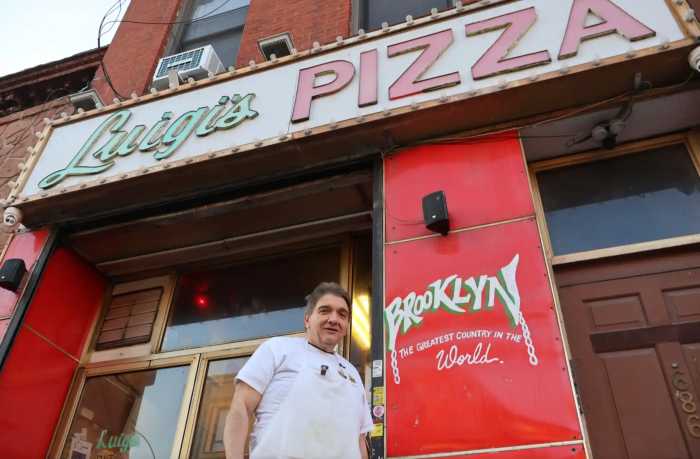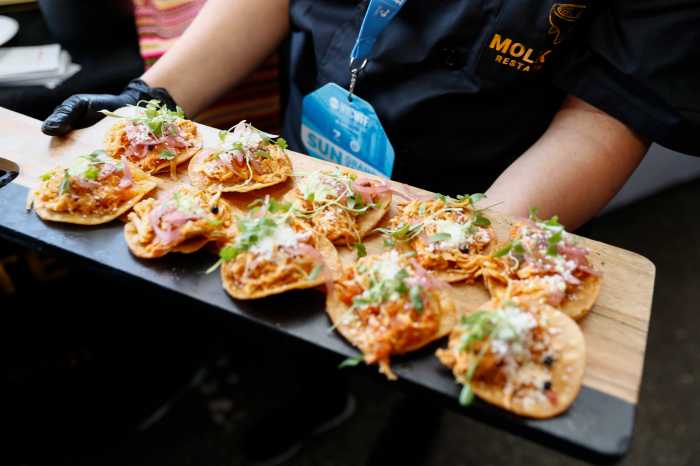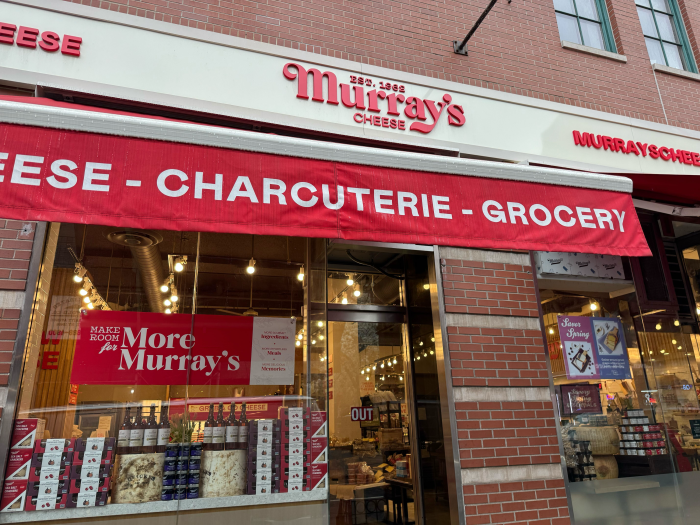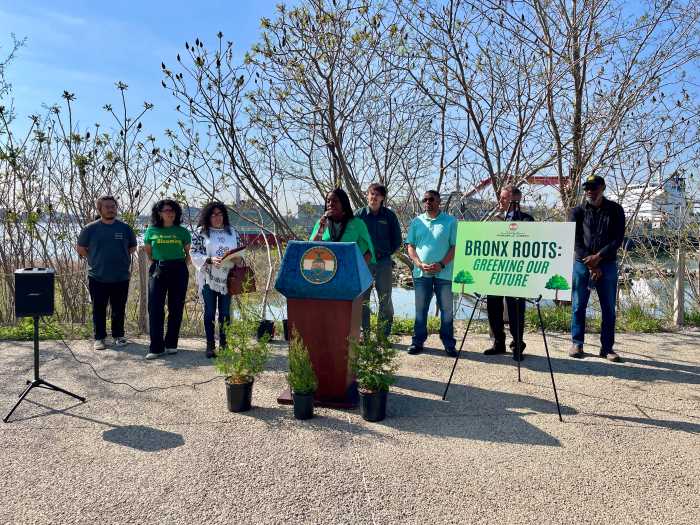
How is working at a bakery like working at City Hall?
“You need to have gallows humor,” says Peter Madonia, 65, an alum of two different mayoral administrations and co-owner of his family’s third-generation business on Arthur Avenue in the Bronx.
As the first deputy FDNY commissioner under then-Mayor Ed Koch, the career civil servant saw his fair share of emergencies. As chief of staff, a role Madonia served under Mayor Michael Bloomberg, Madonia says, “You have the press 90 feet away, who all they want to do is write a bull’s-eye on your head.”
Temperatures rise just as high, both figuratively and literally, on any given day in the back of Madonia Bakery in Belmont, where a four-deck oven can bake up to 80 large loaves at a time.
“You got to keep [things] light otherwise you want to kill each other. It’s close quarters, it’s hot… things are moving fast,” says Madonia, who returned in December, after 16 years in the public and nonprofit sectors, to supervise the making of the shop’s signature breads and sweets with co-owner Charles Lalima. The former chief operating officer at the Rockefeller Foundation timed his homecoming to anticipate the bakery’s 100th anniversary this year, and to coincide with the “controlled chaos” of the holiday season.
At that time of year, “We yell, we scream,” says floor manager Mona Parubi, a Madonia employee for the past 15 years. “It’s drama over here.”

It would take a few months for Madonia to settle back into his old stomping grounds, where, as a teenager, he’d reluctantly worked school day afternoons and picked up weekend deliveries. He knows how to do it all: mix, roll and bake.
“Fifth Avenue and Arthur Avenue are two different worlds, different people, different customers,” says Parubi, who started working at the bakery at age 18 as an Albanian native with a limited knowledge of English. “In the beginning, [Madonia] was a little tough… a little nervous. He’s very, very calm now.”
Madonia agrees: “I’ve completely mellowed out,” he says with a smile. The former executive has traded the pressure of overseeing $200 million in grant funding for the responsibility of managing a much smaller operation, nestled into a supportive ecosystem of Italian specialty shops.

But the two institutions have more in common than you might think: “The notion that you have the longevity, the stick-to-itness, the ability to evolve as an institution for 100 years really hit home for me at Rockefeller,” which celebrated that milestone in 2013, Madonia says. “So in my head I always knew that by 2018, it was time for me to come home.”
One hundred years of bread
The story of Madonia Bakery begins in a small town on the outskirts of Palermo, Sicily, where Peter Madonia’s grandparents met and where he believes his grandfather was an apprentice baker.
Mario Madonia established his business in the Bronx on Adams Place in 1918, selling traditional Italian breads like the crusty pane di casa.
According to the family, his wife gave birth to their youngest son in 1924 inside the actual bakery, when a car crashed into the window front, sending her into labor three months early. No one thought Peter Sr. would live, but a makeshift incubator — a shoe box insulated with cotton and stashed near the oven — pulled him through.
The elder Peter and his brother, Frank, took over the business in the 1960s, by which time their father had already relocated it to the epicenter of the Arthur Avenue neighborhood, next door to the Arthur Avenue Retail Market. They passed along control to Peter’s son Mario two decades later, ushering in a period of significant development for the bakery.
“My brother really took the business to the next step in the ’80s, when the store was half the size it is now,” says Peter Madonia, who pursued a very different kind of work at City Hall after graduating with a master’s degree in urban studies at the University of Chicago. “He renovated, he took a larger space, he started to advance different products” — such as the bakery’s cannoli, “small, crunchy shells, piped fresh to order with dense, citron-laden semifreddo [that] could inspire a cult,” in the words of a glowing New York magazine review — “and built a much bigger biscotti line.” (Today, there’s an entire wall dedicated to the cookie, which Madonia pronounces with a Sicilian accent as “bish-cotti.”)
Then tragedy crumbled everything. In 1988, a car accident killed Mario at age 38, prompting his brother’s return to the bakery.
The bakery’s rises and falls in fortune over the last century speak to its resilience, Peter Madonia says: “It’s been through economic downturns …. It’s been through ownership change. My brother was running the business and one day he wasn’t. We survived that.”
Peter Madonia brought on his business partner, Lalima, five years later, and left management of the shop’s daily affairs to the experienced baker when Bloomberg offered him a staff job trimming the city’s $7 billion budget deficit in 2002. Peter Sr., who has since passed away, kept his eyes on the place, too. The patriarch greeted customers from his customary perch on a shelf next to the self-serve coffee into his 90s.

Now that Madonia is back, both owners devote most of their time in the bakery in the late morning and early afternoon to quality control, eyeballing, touching, sometimes even tasting breads and cookies that may not meet their standards, and pulling any off the shelves that don’t. (They leave the 5:30 a.m. shift to Parubi and Lalima’s son, Jason.)
“Yeah, you’re making the same things over and over again,” Madonia says, “but bread,” which can be affected by all kinds of factors from atmosphere to temperature, “is a living product.”
Growing a tradition
The equilibrium of a neighborhood can be as precarious as that of a loaf and the bakery that makes it.
Centered around Arthur Avenue, the Bronx’s Little Italy is a neighborhood defined by Italian markets, butchers, pasta and pastry shops run by the same families for generations: “It’s not any individual business, it’s a collective that I think makes us unique and allows us to continue the authentic products that our grandparents made,” says Madonia, the chairman of the local Business Improvement District. “People come back for that.”
As much as 80 percent of Madonia’s customers drive from 10 to 40 miles away for the bakery’s hand-rolled breads, according to its own research. On a Thursday morning earlier this month, a former neighbor now living in Virginia came in to order an olive loaf and a black-and-white cookie at the counter.
The question is how to retain the loyalty of those pilgrims, of the police officers who regularly stop in to chat with Parubi in the mornings and of the neighborhood employees who pop in for an afternoon snack — while drawing in foodies from other boroughs and tourists from around the world.

Lalima’s balancing strategy has been to preserve the old recipes and add new ones, like a whole line of specialty bread, incorporating ingredients like olives, fennel and raisins and jalapeño and cheese. He’s currently testing out a roasted garlic bread.
As BID chairman, Lalima’s partner has two brands to consider: “Bread, meat, cheese — you can buy it all [in Little Italy], and it’s all handmade and authentic, with generational roots through all of it,” Madonia says. The question he asks himself, is “How do you maintain that? If real estate prices start to skyrocket, will families cash out?”
Belmont sits in New York’s 15th congressional district, the poorest, most Democratic district in the country as of 2016. But the area has seen an influx of businesses and development proposals for new residential buildings in recent years.
“People ask me all the time: What’s your legacy plan?” continues Madonia, whose daughter works as a guidance counselor at a nearby public school. “I say, ‘Someone has to want this, someone has to feel this the same way I felt that it was right for me to come back here.’ I traveled the world, but I felt it was right to come back.”
Twenty minutes later, on a tour of the flour-dusted, distinctly toasty baking facilities, he’s feeling slightly less sentimental about his return: “This is completely the wrong business for my body temperature and body type,” Madonia says, joking.



































